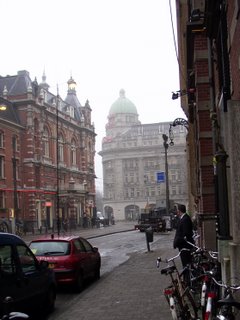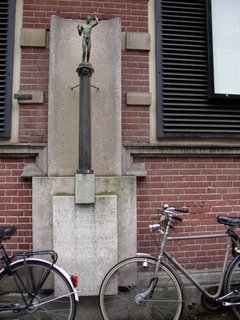The Erosion of History
 Have you ever stopped to consider the number of lives that have overlapped the routines, roles, and routes of the lives that we currently lead on earth? Perhaps it's a bit of a bizarre thought -- but I sometimes wonder how people have been born, how many people who have had their hearts broken, how many people who have conceived babies, who have bled, or who have died in a given geographic point or under a given set of circumstances... those same places and circustances in which I find myself every day.
Have you ever stopped to consider the number of lives that have overlapped the routines, roles, and routes of the lives that we currently lead on earth? Perhaps it's a bit of a bizarre thought -- but I sometimes wonder how people have been born, how many people who have had their hearts broken, how many people who have conceived babies, who have bled, or who have died in a given geographic point or under a given set of circumstances... those same places and circustances in which I find myself every day.Especially in a city as old as Amsterdam, layered with over 800 years of civilization, I find it fascinating to consider the points of intersection among the millions of lives that have coursed throughout the city, throughout the course of history. It's not the kind of thing that preoccupies my thought processes for hours at a time, or that even passes through my mind on a daily basis. But when one considers the probabilities in a city of the size and age of Amsterdam, it's virtually a statistical certainty that every square meter of the old city holds a meaningful memory -- the story of a milestone in someone's life... And it's kind of crazy to think about the stories the stones could tell...
Almost every day, I ride my bicycle down the Marnixstraat just west of the Leidseplein. It's a pretty major thoroughfare, and it happens to run between the place where I live and the place where I work and worship, so this section of the Marnixstraat is kind of just a standard part of my routine. I don't think much about it, and it's doubtful that any of the vast throng of people pumping through this artery of the living city consider the setting at all on their way to shopping, parties, movies, or restaurants. But every day, as I ride my bicycle down the Marnixstraat just west of the Leidseplein, I am watched by a silent figure -- a solitary stranger gazing down upon the Marnixstraat with cold green eyes. And when I realize this, I feel the breath of history on my neck.

A small copper statue, about the size of a Barbie doll, stands atop a long pillar, between the Nieuw de la Mar theater and the American Hotel -- his left arm raised curiously, as if asking a question to all who would pass by. Beneath the pillar, below waist-level, a faded stone enscription tells the story of this square meter:
"On this spot, on 6 January 1945, five Dutch men were executed by the German occupying forces in retaliation for a display of national patriotism which was carried out on this same spot" (original text in Dutch; my translation).
And when I stop to read this enscription and look at this statue, I cannot believe how mundane this strip of sidewalk has become. People walk by without a second glance, chatting on a mobile telephone, flirting and laughing, cursing the wind and the rain from beneath an umbrella or hood. There is no recognition or realization of what this place meant to five young lives, to five families, to a nation embroiled in a bitter war. History is swallowed up in the routine of daily life. Even the limestone foundation stone has begun to loose its memory, as the words of the marker become harder and harder to make out.
Indeed, our lives are small and short. The expanse of our existence is merely incidental to the history of the world. Our most meaningful landmarks eventually become a blank canvas for someone else's painting. Such a realization can be comforting, or it can be agonizing... Which is it for you?


1 Comments:
If I'm not mistaken, Eric, that is the exact statue I "suddenly" ran across after I had been living in Holland for a year and a half. I pointed out to those walking with me how Holland was so full of history I kept running across more of it, even in places where I had been a hundred times. I believe even Jurren hadn't noticed the statue before, even though he too had walked close enough to touch it several times a week. I think it is a reminder that something so important now will be forgotten so quickly in this world. The poem of Ozymandius tells it well, and Ecclesiastes tells it better. But though this world will not not remember me, I take comfort in the knowledge I will still live, and so will many of my efforts, forever.
Perzik
Post a Comment
<< Home